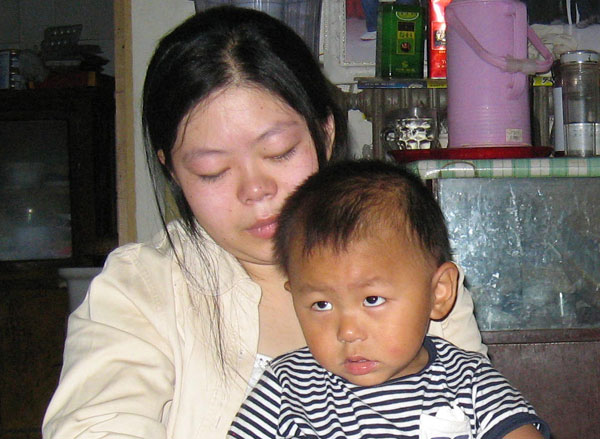Teachers feel exam pressure, too
Updated: 2012-06-08 08:37
By Luo Wangshu (China Daily)
|
||||||||
|
Ma Tingting holds her 19-month-old son at home in Guantao county, Hebei province, on May 29. Ma's husband, Zhao Peng, a teacher, killed himself ahead of this year's gaokao due to work pressure. Luo Wangshu / China Daily |
Zhang Ting has been struggling to sleep for weeks, unable to turn her mind from the dreaded national college entrance exam.
"I've felt sick and anxious all this month," she said during a study break at Beijing No 5 High School. "You can smell the tension around here."
And Zhang is not even a student; she is a teacher.
"It's just as nerve-racking for us as it is for them," said the 28-year-old, who has been in the job for two years. "Student or teacher, we're all in the same boat."
The annual exam, more commonly known as gaokao, which is on Thursday and Friday this year, has been held since 1977 and is arguably the most daunting challenge a Chinese student will ever face.
Yet, experts in health and education say the adults who teach them are under just as much pressure.
A 2010 study that appeared in the Journal of Jiangsu Institute of Education showed that almost 45 percent of primary and middle school teachers are experiencing some form of psychological problem.
Likewise, a poll conducted by Southwest University last year found many respondents complained of overwork and extreme anxiety.
The situation is even worse in the run up to gaokao, warned Guo Xiamei, an educational psychologist at Ohio State University in the United States, "purely because it's such an essential time for Chinese youths".
Schools often provide benefits for senior class teachers, such as vacations paid by schools. However, students' performance at gaokao ties with teachers' income in some areas, which adds to the pressure.
Sheng Zhihao, a teacher at Beijing No 44 Middle School for more than seven years, said the problem is so bad that many people are leaving the profession.
No official data are available. However, he estimated that "about 5 to 10 percent of teachers (in his area) are quitting the classroom every year. I hope to be one of them this year."
The situation is the same nationwide, and some teachers have taken even more drastic measures, such as Zhao Peng, a senior-class teacher in Hebei province who killed himself just weeks ahead of this year's gaokao.
The 29-year-old, who was married and had a baby son, drank a bottle of pesticide in his office at Guantao No 1 High School on April 27.
In a suicide note, he wrote that he was unable to "endure the agonizing pain", and added: "The endless work is smothering me."
Zhao's widow, Ma Tingting, said she noticed that her husband had seemed exhausted in the days before his death.
"He looked tired and had lost much hair," she said. "He told me he could fall asleep in a second."
Like the other 200 or so teachers at Guantao No 1 High School, Zhao started work at 6 am and didn't return home until at least 10:30 pm.
Ma blamed herself for not taking the signs seriously. "He might blame me, too."
"I wish I had noticed his abnormal behavior earlier," said Chen Lei, Zhao's colleague and close friend, adding that Zhao seemed anxious on the previous night.
"He was rubbing his hair during our regular meeting, and looked upset. I wanted to ask him about what happened, but then I was busy arranging the next day's examination and forgot it. If I had ," Chen said regretfully and couldn't continue.
Wang Lijuan, an associate professor at Southwest University, wrote in the Journal of the Chinese Society of Education, that it is important for education authorities and teachers themselves to give more attention to the anxiety, and she encourages teachers to seek social support to conquer the psychological problem.
"There are a few key symptoms of depression, which Zhao displayed, such as tiredness, giving up regular hobbies," said Guo at Ohio State University, adding that the abnormal behavior lasted more than two weeks, which is also a key measurement factor for depression.
"Zhao might have suffered from depression," she said. "Schools should pay more attention to teachers' psychological health."
She also said that if schools, families and teachers were aware of the pressure teachers feel and its possible effects, teachers would be more likely to seek help from doctors or other social support.
"The problem in China is that teachers get less attention," she added.
Contact the writer at luowangshu@chinadaily.com.cn

 Relief reaches isolated village
Relief reaches isolated village
 Rainfall poses new threats to quake-hit region
Rainfall poses new threats to quake-hit region
 Funerals begin for Boston bombing victims
Funerals begin for Boston bombing victims
 Quake takeaway from China's Air Force
Quake takeaway from China's Air Force
 Obama celebrates young inventors at science fair
Obama celebrates young inventors at science fair
 Earth Day marked around the world
Earth Day marked around the world
 Volunteer team helping students find sense of normalcy
Volunteer team helping students find sense of normalcy
 Ethnic groups quick to join rescue efforts
Ethnic groups quick to join rescue efforts
Most Viewed
Editor's Picks

|

|

|

|

|

|
Today's Top News
Health new priority for quake zone
Xi meets US top military officer
Japan's boats driven out of Diaoyu
China mulls online shopping legislation
Bird flu death toll rises to 22
Putin appoints new ambassador to China
Japanese ships blocked from Diaoyu Islands
Inspired by Guan, more Chinese pick up golf
US Weekly

|

|







